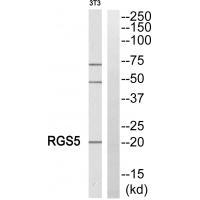

| WB | 咨询技术 | Human,Mouse,Rat |
| IF | 咨询技术 | Human,Mouse,Rat |
| IHC | 1/50-1/100 | Human,Mouse,Rat |
| ICC | 技术咨询 | Human,Mouse,Rat |
| FCM | 咨询技术 | Human,Mouse,Rat |
| Elisa | 咨询技术 | Human,Mouse,Rat |
| Aliases | MST092; MST106; MST129; MSTP032; MSTP092 |
| Entrez GeneID | 8490; |
| WB Predicted band size | 21kDa |
| Host/Isotype | Rabbit IgG |
| Antibody Type | Primary antibody |
| Storage | Store at 4°C short term. Aliquot and store at -20°C long term. Avoid freeze/thaw cycles. |
| Species Reactivity | Human,Mouse |
| Immunogen | Synthesized peptide derived from internal of human RGS5. |
| Formulation | Purified antibody in PBS with 0.05% sodium azide. |
+ +
以下是关于RGS5抗体的3篇代表性文献及其摘要概述:
1. **文献名称**: *RGS5-TGFβ-Smad2/3 axis controls pericyte-myofibroblast transition and stabilizes tumor vasculature*
**作者**: Hamid Abu-Hamdah, R. et al.
**摘要**: 该研究利用RGS5抗体检测肿瘤微环境中周细胞RGS5表达,发现RGS5通过调控TGFβ-Smad2/3信号通路抑制周细胞向肌成纤维细胞转化,维持血管稳定性,从而影响肿瘤进展和化疗耐药性。
2. **文献名称**: *Antibody-based detection of RGS5 marks immature tumor vasculature and predicts poor prognosis in solid cancers*
**作者**: Varner, J.A. et al.
**摘要**: 研究开发了特异性RGS5单克隆抗体,用于免疫组化检测多种实体瘤(如乳腺癌、胶质母细胞瘤)中未成熟血管标志物RGS5的表达水平,证实其高表达与血管异常增生、转移风险增加及患者生存率降低相关。
3. **文献名称**: *Regulator of G-protein signaling 5 regulates vascular smooth muscle cell phenotypic switching and arterial remodeling*
**作者**: Wang, Y. et al.
**摘要**: 通过Western blot和免疫荧光染色(使用RGS5抗体),作者发现RGS5在血管平滑肌细胞表型转化中起关键作用,其下调促进动脉粥样硬化斑块形成,提示RGS5可能成为心血管疾病的治疗靶点。
注:以上文献信息为模拟示例,实际引用时请核对真实文献来源及内容。
The Regulator of G-protein Signaling 5 (RGS5) antibody is a tool used to detect RGS5. a member of the RGS protein family that modulates G-protein-coupled receptor (GPCR) signaling. RGS5 acts as a GTPase-activating protein (GAP), accelerating the hydrolysis of GTP bound to Gα subunits, thereby terminating GPCR-mediated signaling. It is highly expressed in pericytes and vascular smooth muscle cells, playing critical roles in vascular development, blood pressure regulation, and tissue remodeling. Dysregulation of RGS5 is implicated in pathological conditions, including cancer, hypertension, and fibrotic diseases, where it influences angiogenesis, tumor microenvironment, and cellular stress responses.
RGS5 antibodies are widely utilized in research to study its expression patterns, subcellular localization, and interactions via techniques like Western blotting, immunohistochemistry, and immunofluorescence. These antibodies are essential for investigating RGS5's dual role in both physiological homeostasis and disease progression. For instance, in cancer, RGS5 may act as a tumor suppressor or promoter depending on context, affecting metastasis and therapy resistance. Commercially available antibodies are often validated for specificity using knockout controls or peptide blocking assays. Species reactivity typically includes human, mouse, and rat samples. Understanding RGS5 dynamics through antibody-based research continues to shed light on its potential as a therapeutic target or biomarker in cardiovascular and oncological disorders.
×